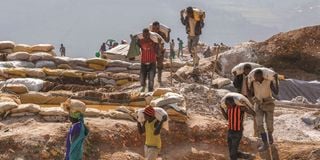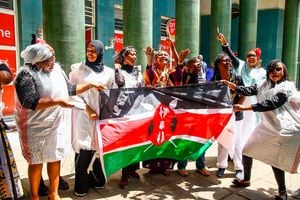
Labourers carry sacks of ore at the SMB coltan mine near the town of Rubaya in the Eastern Democratic Republic of Congo on August 13, 2019.
Africa does not face a resource problem — it holds the key to the world’s green future. The continent is rich in critical minerals like cobalt, lithium, and copper, essential for renewable energy technologies such as electric vehicles and solar panels.
With the youngest and fastest-growing workforce globally, Africa has a unique opportunity to lead the green transition. Unlocking this potential will not only help achieve global climate goals but also drive sustainable development, creating jobs, industries, and prosperity for millions across the continent.
So what is holding us back? Of course there are a myriad of reasons but one that does prevail and cut across most of the continent is our choice of leaders and whose interests they prioritise.
Last week we spoke of elite capture and we see this very clearly when it comes to our precious natural resources being extracted and sold, with virtually no benefit accruing to the majority .
How else can we explain that the Democratic Republic of Congo, home to over 70 per cent of the world’s cobalt reserves, is among the poorest nations globally?
This wealth, vital for the green transition, remains untapped for national progress.
The story repeats across Africa — Niger with its uranium, Guinea with bauxite, Zimbabwe with lithium. The resources are there, the potential is limitless, but leadership must rise to harness it for collective prosperity.
Vision for green industrialisation
Recently, a mining and artificial intelligence startup named KoBold Metals raised an astonishing $527 million in funding in their efforts to become a key player in the race for critical minerals needed for the clean energy transition.
A lot of these minerals are found in Africa. Historically it would have been a forgone conclusion that these critical minerals would be carted away and only benefit people far away.
But in this era of justice in the transition, the promise of moments like the Africa Climate Summit, Africa boldly took charge of its future through the Nairobi Declaration, championing a transformative vision for green industrialisation that should benefit local entrepreneurs like Cecilia.
By prioritising renewable energy-powered industries, adding value to its vast natural resources, and advocating for fair global trade, Africa positioned itself not as a net consumer of goods and services made from their mineral resources, but as a leader in sustainable development engaging in a localized manufacturing reality.
Now more than ever it is important that as Africans we take advantage of this period of immense energy transition to shift our focus to value addition from only being a point of clean energy extraction.
It is time to change the pervasive single narrative that paints Africa as a poor, fast-growing continent with vast “potential” yet with zero expectations.
We can no longer afford to sit idly by as our immense wealth is siphoned away, leaving our people and environment behind.
Demand for critical minerals
The time for complacency is over. In a world undergoing rapid political and economic shifts, the need for Africa’s presence at the decision-making table has never been greater.
The global north’s insatiable demand for critical minerals — driven by AI, tech innovation, green industrialization, and electric vehicles — presents both an opportunity and a warning. On the surface, this demand should be Africa’s golden ticket to prosperity.
We have 30 per cent of the world’s mineral reserves beneath our feet, we hold the keys to the future of the global economy.
Yet, without visionary leadership and strong governance, it risks becoming yet another chapter of exploitation.
The truth be told: It is the role of the government to safeguard their citizens, grow the economy by creating an enabling economy and protect its environment. This is not just a fight for resources; it is a fight for dignity, sovereignty, and the sustainable future we owe to generations yet to come.
As Africans, we should strive to develop innovative partnerships across the board in the green energy transition to grow green industrialisation, and partnerships rooted in mutual respect.
These should move beyond the extractive and predatory practices that have dominated so much of the trade and investment patterns today and left a legacy of poverty.
If and only if entrepreneurs like Ceclia can access and harness our natural resources, especially being able to leverage our critical minerals to develop our green economies, and succeed, then can we fully realise our ambitions.
Wanjira Mathai is the MD for Africa & Global Partnerships at the World Resources Institute and Chair of the Wangari Maathai Foundation.










